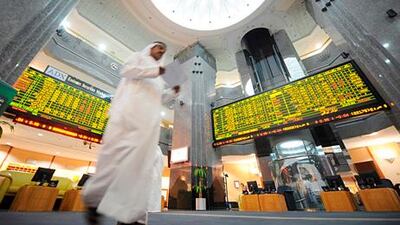Investors not already fleeing the Emirates for cooler climes this summer may find opportunities scarce during the final week of trading before Ramadan begins.
But investors looking to position themselves for the second-quarter earnings season may yet find some chances, fund managers said.
Ramadan is expected to begin on July 21, according to the Wam news agency.
Volumes are likely to remain subdued for this week, said Sachin Mohindra, a portfolio manager at Invest AD.
"We're already into a quiet period ahead of Ramadan, and that's likely to continue," he said. "But investors will be watching second-quarter results, especially for signs of loan growth and margins in the banking sector, as well as any evidence of rental income growth in the real estate sector, particularly at Emaar."
With many companies expected to report second-quarter earnings during the holy month, there may yet be some catalysts for local stocks, Mr Mohindra added.
"The markets might see a slight uptick in volumes during Ramadan as local investors react to results and also position themselves for the traditional rallies after Eid, and in the fourth-quarter, when large institutions typically make asset allocation decisions."
For those investors still looking to take positions ahead of companies' earnings announcements, stocks look cheap and will be well-supported by improving economic fundamentals, said Rami Sidani, a fund manager and the head of Middle East and North Africa at Schroders.
Companies in the banking and property sectors are expected to report increased growth as government expenditure filters through and property markets recover, he added.
"Dubai continues to benefit from the political instability in [other parts of] the region, while Abu Dhabi continues to benefit from strong government spending as well," he said. "We're seeing a stabilisation within the real estate sector as a result of strong demand."
Local markets slinked through a dull week of trading last week as Ramadan approaches and trading volumes ebbed.
The Dubai Financial Market General Index declined 0.9 per cent to 1,491.08 during the course of the week, while the Abu Dhabi Securities Exchange General Index slid 0.2 per cent to end at 2,466.54.
Nonetheless, local bourses outperformed the MSCI Emerging Market Index, which sank 2.1 per cent to 926.13 over the week.
Amid the global gloom on equity markets, investors are closely watching central banks around the world for moves to kick-start growth.
Rate cuts last week by the People's Reserve Bank of China and the European Central Bank and fresh stimulus from the Bank of England did little to arrest stock market declines for long.
The Federal Reserve chairman Ben Bernanke's testimony before the US Congress this week will be closely scrutinised for signs of further stimulus.
Minutes from the US federal open markets committee released last week showed policymakers were not yet convinced of the need for a third round of quantitative easing (QE3) to boost the US economy.
"Even though the incoming economic data have deteriorated further since the Fed's decision last month to extend its Operation Twist, we don't think they have been bad enough to persuade a majority of officials to back QE3, at least not yet," analysts from Capital Economics wrote in a research report.
The euro-zone debt crisis threatened to spill over on to world markets after Moody's Investors Service cut Italy's credit rating by two notches to Baa2, but investors shrugged off the downgrade and the country's borrowing costs fell at an auction of €3.5 billion of sovereign debt later that day.
Despite a poor showing for equities, oil prices rose to a two-month high on Friday, with Brent crude futures gaining US$2.22 to $103.47 and West Texas Intermediate crude advancing $1.02 to $87.10 per barrel.
The Saudi Tadawul All-Share Index gained 0.62 per cent to 6,701.09 in trading yesterday.

